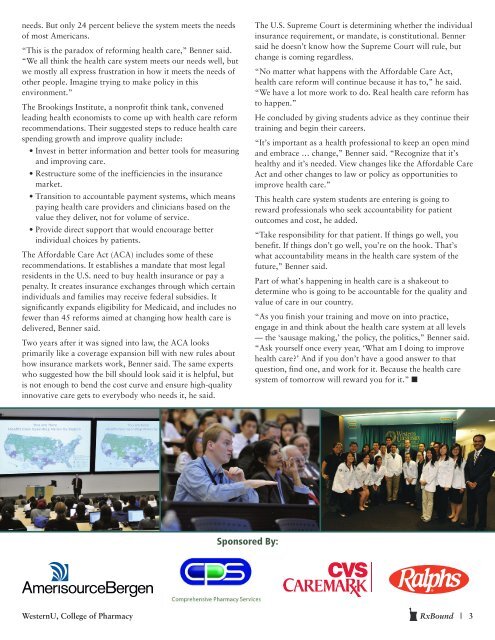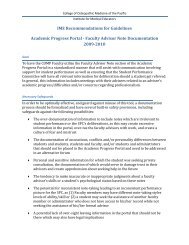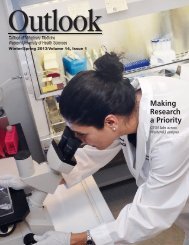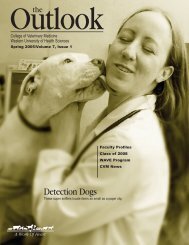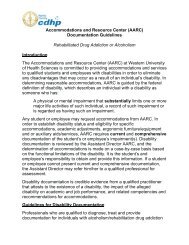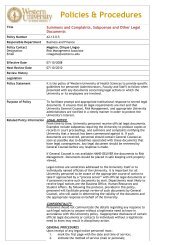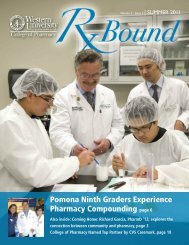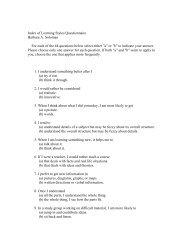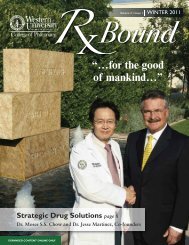Summer 2012 - Western University of Health Sciences
Summer 2012 - Western University of Health Sciences
Summer 2012 - Western University of Health Sciences
You also want an ePaper? Increase the reach of your titles
YUMPU automatically turns print PDFs into web optimized ePapers that Google loves.
needs. But only 24 percent believe the system meets the needs<br />
<strong>of</strong> most Americans.<br />
“This is the paradox <strong>of</strong> reforming health care,” Benner said.<br />
“We all think the health care system meets our needs well, but<br />
we mostly all express frustration in how it meets the needs <strong>of</strong><br />
other people. Imagine trying to make policy in this<br />
environment.”<br />
The Brookings Institute, a nonpr<strong>of</strong>it think tank, convened<br />
leading health economists to come up with health care reform<br />
recommendations. Their suggested steps to reduce health care<br />
spending growth and improve quality include:<br />
• Invest in better information and better tools for measuring<br />
and improving care.<br />
• Restructure some <strong>of</strong> the inefficiencies in the insurance<br />
market.<br />
• Transition to accountable payment systems, which means<br />
paying health care providers and clinicians based on the<br />
value they deliver, not for volume <strong>of</strong> service.<br />
• Provide direct support that would encourage better<br />
individual choices by patients.<br />
The Affordable Care Act (ACA) includes some <strong>of</strong> these<br />
recommendations. It establishes a mandate that most legal<br />
residents in the U.S. need to buy health insurance or pay a<br />
penalty. It creates insurance exchanges through which certain<br />
individuals and families may receive federal subsidies. It<br />
significantly expands eligibility for Medicaid, and includes no<br />
fewer than 45 reforms aimed at changing how health care is<br />
delivered, Benner said.<br />
Two years after it was signed into law, the ACA looks<br />
primarily like a coverage expansion bill with new rules about<br />
how insurance markets work, Benner said. The same experts<br />
who suggested how the bill should look said it is helpful, but<br />
is not enough to bend the cost curve and ensure high-quality<br />
innovative care gets to everybody who needs it, he said.<br />
The U.S. Supreme Court is determining whether the individual<br />
insurance requirement, or mandate, is constitutional. Benner<br />
said he doesn’t know how the Supreme Court will rule, but<br />
change is coming regardless.<br />
“No matter what happens with the Affordable Care Act,<br />
health care reform will continue because it has to,” he said.<br />
“We have a lot more work to do. Real health care reform has<br />
to happen.”<br />
He concluded by giving students advice as they continue their<br />
training and begin their careers.<br />
“It’s important as a health pr<strong>of</strong>essional to keep an open mind<br />
and embrace … change,” Benner said. “Recognize that it’s<br />
healthy and it’s needed. View changes like the Affordable Care<br />
Act and other changes to law or policy as opportunities to<br />
improve health care.”<br />
This health care system students are entering is going to<br />
reward pr<strong>of</strong>essionals who seek accountability for patient<br />
outcomes and cost, he added.<br />
“Take responsibility for that patient. If things go well, you<br />
benefit. If things don’t go well, you’re on the hook. That’s<br />
what accountability means in the health care system <strong>of</strong> the<br />
future,” Benner said.<br />
Part <strong>of</strong> what’s happening in health care is a shakeout to<br />
determine who is going to be accountable for the quality and<br />
value <strong>of</strong> care in our country.<br />
“As you finish your training and move on into practice,<br />
engage in and think about the health care system at all levels<br />
— the ‘sausage making,’ the policy, the politics,” Benner said.<br />
“Ask yourself once every year, ‘What am I doing to improve<br />
health care’ And if you don’t have a good answer to that<br />
question, find one, and work for it. Because the health care<br />
system <strong>of</strong> tomorrow will reward you for it.” ■<br />
Sponsored By:<br />
<strong>Western</strong>U, College <strong>of</strong> Pharmacy RxBound | 3


